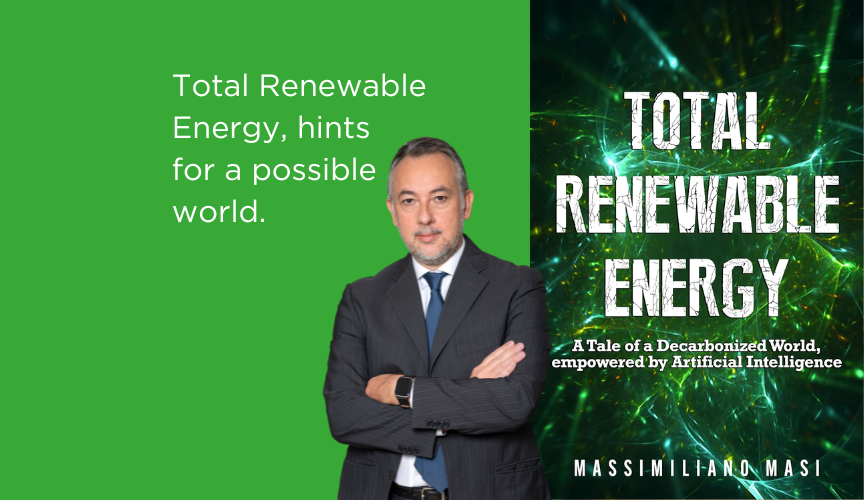
by Massimiliano Masi, General Manager Magaldi Green Energy Middle East
There is a saying believed to be of Chinese origin, though its exact roots remain uncertain: “Be careful what you wish for, you might just get it”. Now, I would be thrilled if the story narrated in my new book, “Total Renewable Energy” could truly come to fruition.
Climate change is not merely a subject for debates among scientists or discussions over Sunday lunch. It is an issue that will shape the future of every living being on this planet. Global warming, the escalation of natural disasters, and the relentless increase in average temperatures have long been echoing in our ears. However, are we truly heeding these warnings, or have we already become numb, desensitized?
If this sounds rhetorical, it's because we often refuse to confront the reality that, as evidenced by hailstones the size of tennis balls falling from the sky, we may be approaching a tipping point where the consequences will be far more severe than damage from hail or a severe storm.
Mind the normalcy bias, from Covid pandemic to climate change
Statistics may seem tedious, but they reveal a stark reality: floods, fires, sudden and intense weather events are merely the initial indicators of climate change. Since the industrial era began, our planet's average temperature has risen by “only” 1.2 degrees. Now, imagine the potential consequences of an additional 2 or 3-degree increase in the decades ahead. In fact, the trend is accelerating.
Humans often have a tendency to underestimate impending dangers, holding onto the hope that everything will return to normal. This phenomenon is known as “normalcy bias”, a psychological trait that leads us to downplay the severity of disasters. A classic example of this can be observed in the sinking of the Titanic. Many passengers and crew members disregarded early warning signs, convinced that the ship was unsinkable. Even when it became clear that the ship was indeed sinking, a significant number still denied the gravity of the situation, behaving as if all was well. This delayed response contributed to the tragedy, resulting in fatal consequences for many on board. We've witnessed a similar pattern with the Covid-19 pandemic, and now we see it unfolding in the context of climate change: after all, summer has always been hot; what could be more “normal” than that?
Collective responsibility: a shared AI and renewable call
In “Total Renewable Energy” I delve into the topics of collaboration, innovation, and the integration of Artificial Intelligence on our journey toward a world free of fossil fuels. This isn't a technical manual; rather, it's a narrative, a scenario that could unfold in the strategic energy sector. It's also a call to share in collective responsibility.
In the book, I discuss the phenomenon of the S-curve. Unlike a straight line, it doesn't progress linearly, where each additional element produces the same effect. In the S-curve, initial elements have a limited impact, but then there's a critical turning point where the effect of each added component becomes more than proportional. Think of it as a scale: on a linear scale, adding 1kg weights increases the total weight by 1kg each time. On an S-curve scale, the first weights from 80g to 100g have little significance, but suddenly, with the addition of the eleventh 10kg weight and the twelfth 12kg weight, the total weight surges dramatically.
The same applies to climate change effects: initially, increased CO2 produces mild impacts, but beyond a critical threshold, every further increase leads to catastrophic effects.
Embracing the path to a decarbonized future: harnessing technology for sustainability
What we are witnessing is reminiscent of the first puffs of smoke from a volcanic eruption. We cannot afford to waste time arguing while the world burns, drowns, and struggles to breathe. The transition to a decarbonized future is not an option; it is a necessity. Although this journey may appear daunting, it is achievable.
The technology is readily available. Artificial Intelligence, for instance, plays a crucial role in managing the energy grid amidst intermittent renewable energy sources. AI can already predict weather patterns, balance energy supply and demand, utilize energy storage systems, and maintain a consistent energy flow. It is now possible to envision the widespread adoption of green technologies. Let’s consider the rapid advancements in solar and wind energy, as well as the emergence of newer energy storage technologies - batteries made from entirely sustainable materials like sand and steel — that mitigate the intermittency of sun and wind, ensuring continuous power supply for both domestic and industrial needs. But even before technology, what we truly need is a broad awareness and a cultural shift. We require open innovation to facilitate the swift exchange of knowledge, transcending geographical boundaries.
In conclusion, I would like to remind everyone of the wisdom contained in the Native American saying: “We do not inherit the land from our ancestors; we are borrowing it from our children”. This age-old adage should prompt us to reflect on the imperative to take action today to safeguard the future for the generations to come.



